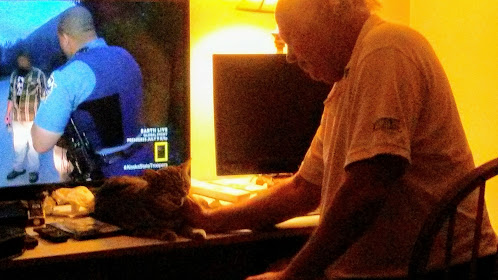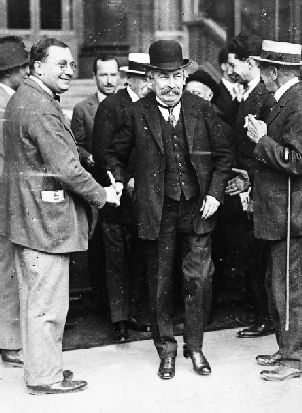The Man who Outlawed War
Sanctions and War
Senator Bob Menendez (D-NJ) wants to impose the mother of all sanctions upon Russia if they don't do what he wants them to do. American politicians seem to be a crazed lot. If any person or country doesn't immediately acquiesce to their demands, they want to hurt them. That's the nature of the bureaucratic state. Lately, economic boycotts and trade embargoes is how they do it. It seems a safe and legal option short of war. Never mind the innocents who are starved in all sorts of ways. Once upon a time, and not too long ago, blockades and enforced global sanctions were regarded as illegal acts of war. That's why they seldom ever happened. Eleven-time French Prime Minister Aristide Briand decided to change that. Before him, nations needed to actually declare war if they wanted to interfere with another nation's trade economy. The declaration of war made it legal. Now they don't do it anymore.
The World War and you
Briand was a product of the World War that still rages and confounds us in every possible way. Indeed, the present conflicts in Ukraine and the Middle East can be seen in light of the World War that began in 1914 and never ended. Literally, 1000 battles have already been fought there with more to come. The only way to make sense of what seems to be a series of unrelated and inexplicable violent cataclysms is to see the World War for what it is: a product of the military/prison/industrial complex that created the World War and thrives because of it. The exorbitant price you pay for fuel, the inflation at the market, your closed local library, irredeemable credit card and national debt, the potholes don't get repaired, and the parking ticket that costs 100 bucks; all that comes from the war that never ends.
War is outlawed
Legal problems regarding the war arose early when the French tried to get their hands on deposed German Emperor Wilhelm II in 1920. All the French propaganda outlets blamed him for the war. Under his nominal command, the German Army had totally trashed the part of France they occupied. The French wanted someone to hang for it. But Willy was too fast for them. He quickly packed his bags and absconded to Holland. The victors wanted to put him on trial as a war-criminal but the Dutch wouldn't hand him over. Wilhelm had, in fact, broken no laws. War was not an illegal act, nor was conspiring to wage one. They did it all the time. This was when French PM Aristide Briand got the idea that war should be made illegal. He was lucky enough, and old enough, to have missed the shooting war. He served as a minister in various functions, mostly in Greece, where the French had opened a southern front in 1915. Intelligent and well read, he drank the best cognac and liked to party. He was pals with Jules Verne and Briand's girl friend was, undoubtedly, the most interesting woman in the world. Princess Marie Bonaparte was a direct descendant of Emperor Napoleon I and world renowned bon vivant.
There is a statue of her in the Philadelphia Museum of Art. The artist fashioned it in tribute to her as one of the first psychoanalysts and sex researchers. It's called Princess X.
Briand had connections all over the place and tried to get her crowned Queen of Greece; even then a nation in permanent chaos. She would have been a worthy successor to Helen of Troy but alas it was not to be. Later on she would ransom Sigmund Freud from the Gestapo (a German acronym for Geheime Staatspolizei: secret state police). She rescued all his private papers and rigamarole too. The princess set him up nicely in London because she had the moola. Marie was part of that circle of Royalists and Bonapartists who still wait around for the French Republic to collapse, an event that might, even now, be just right around the corner.
It seemed like a good idea at the time
In between trysts with Princess Marie, Briand outlawed war. What a fine fellow he was! The Kellogg-Briand Pact was presented to the world in 1929 and originally signed by 15 nations with many more to follow. Briand got American Secretary of State Frank B. Kellogg to lend some weight to the treaty although Kellogg never lifted a finger. Needless to say the treaty didn't work very well. One can still encounter articles heaping derision upon it. Little discussed is that the treaty inverted our understanding about the legality of war and what acts constitute war. According to international law at the time, neither Wilhelm II, nor any of the other actors involved in the outbreak of the war, did anything unlawful. In fact, to make it all legal (and to give neutral nations warning) was why they declared war. Now, thanks to Kellogg-Briand, nations don't do it anymore. Instead they try to either bomb 'em back into the Stone Age or starve them out; most of the time both; all without any kind of declaration. The USA hasn't declared war on anybody since 1942 even though they are involved in an endless series of armed conflicts ever since. But the treaty took another profound step in that, by implication, it made blockades legal. Prior to 1929, if a nation tried to obstruct another nation's financial system, it was considered an act of war. Blockades of any kind were deemed de facto declarations of war. That's because they are. But now, the situation is turned completely upside-down. Briand thought that embargo would be a way to dissuade nations from aggression short of war. It didn't work out that way.
The Law of Unintended Consequences
(Note: You can view every article as one long page if you sign up as an Advocate Member, or higher).








